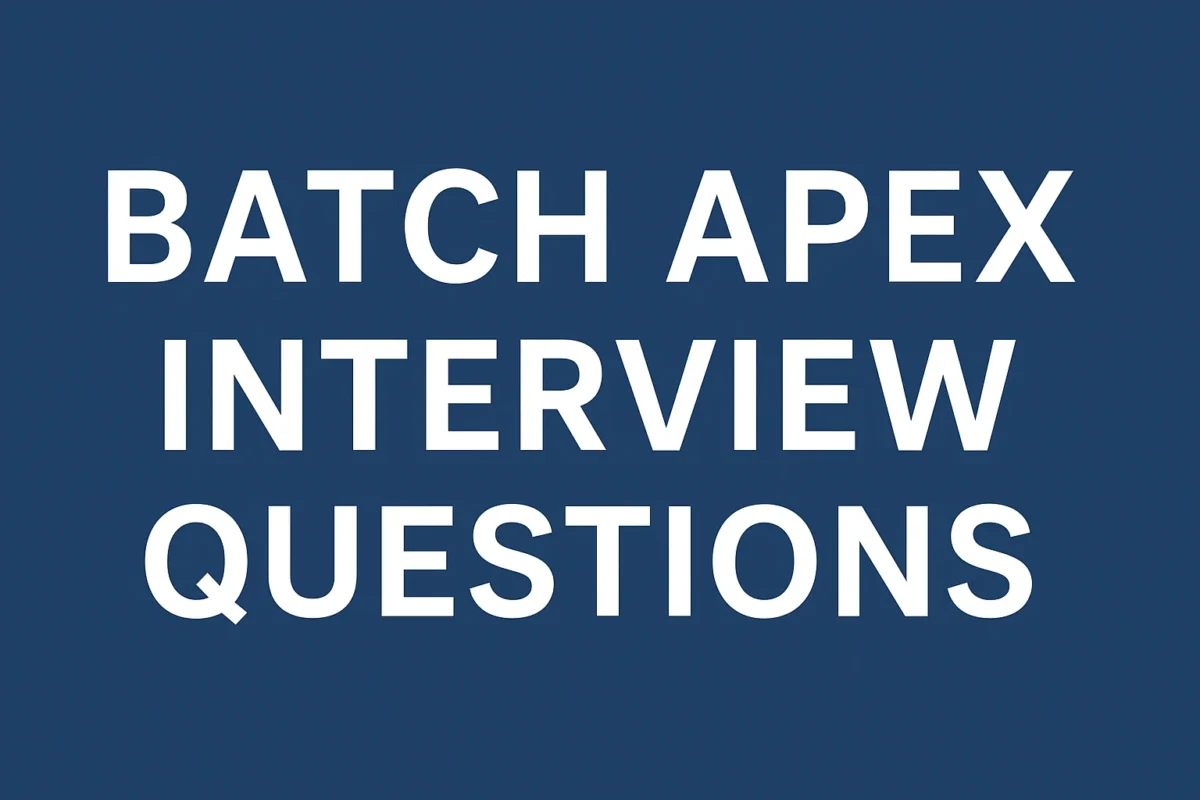
If you are preparing for a Salesforce developer role, Batch Apex is one of the most common topics you’ll encounter in technical interviews. Recruiters often focus on Batch Apex to assess your understanding of handling large data volumes, asynchronous processing, and governor limits in Salesforce.
In this guide, we will cover the most frequently asked Batch Apex interview questions along with explanations and tips to help you answer confidently.
What is Batch Apex in Salesforce?
Batch Apex is a powerful Salesforce feature that allows you to process large amounts of records asynchronously in manageable chunks. Instead of processing all data at once (which can hit governor limits), Batch Apex splits the job into smaller batches, each executed separately.
Top Batch Apex Interview Questions and Answers
1. What is Batch Apex and why do we use it?
Answer:
Batch Apex is used to process large data volumes asynchronously by dividing them into smaller, manageable batches. It helps avoid hitting governor limits and improves system performance.
2. What are the main methods in the Database.Batchable interface?
Answer:
A Batch Apex class must implement the Database.Batchable<SObject> interface, which has three methods:
-
start() – Used to collect the records to be processed.
-
execute() – Processes each batch of records.
-
finish() – Executes after all batches are processed, often used for post-processing or sending notifications.
3. How do you call a Batch Apex class?
Answer:
You can execute a Batch Apex class using:
Here, 200 is the batch size.
4. What is the maximum batch size in Batch Apex?
Answer:
The maximum batch size is 2,000 records, and the default batch size is 200 records.
5. How many batch jobs can run concurrently in Salesforce?
Answer:
Only 5 batch jobs can run concurrently, and up to 100 batch jobs can be queued or active at the same time.
6. Can we call a batch class from another batch class?
Answer:
You cannot directly call one batch from another batch in the same execution context, but you can chain batches using the finish() method.
7. What is batch chaining in Salesforce?
Answer:
Batch chaining means starting another batch job from the finish() method of the previous batch job, useful for sequential processing.
8. How do you handle governor limits in Batch Apex?
Answer:
Since each execution of a batch runs in its own context, governor limits reset for every batch, making it efficient for large data processing.
9. What are the advantages of Batch Apex?
-
Handles millions of records.
-
Avoids hitting governor limits.
-
Can run asynchronously.
-
Supports scheduling and chaining.
10. What are the limitations of Batch Apex?
-
Limited concurrent execution.
-
Can be complex to debug.
-
Higher execution time for large datasets compared to optimized real-time processing.
Batch Apex Best Practices for Interviews
-
Keep batch size optimal (200–500 for most cases).
-
Use Database.Stateful if you need to maintain state across batches.
-
Avoid SOQL/DML inside loops.
-
Use QueryLocator for large datasets and Iterable for custom data sets.
-
Always handle exceptions to avoid job failures.
FAQs on Batch Apex Interview Questions
Q1. What is the difference between Batch Apex and Queueable Apex?
Batch Apex is better for very large datasets, while Queueable Apex is suited for smaller asynchronous jobs that can be chained easily.
Q2. Can we use Batch Apex for callouts?
Yes, but you must implement the Database.AllowsCallouts interface in your batch class.
Q3. How to monitor Batch Apex jobs in Salesforce?
Go to Setup → Apex Jobs to check the status, progress, and logs.
You May Like : Apex Interview Question 2025
Conclusion
If you want to ace a Salesforce Batch Apex interview, focus on understanding how Batch Apex works, its limitations, and best practices. Prepare both theoretical answers and real-world code examples. With the above Batch Apex interview questions, you’ll be well-prepared to impress recruiters and land your Salesforce developer role.

